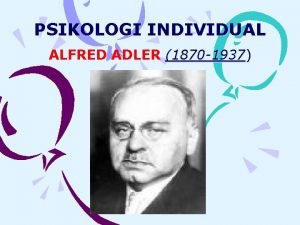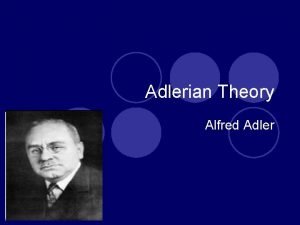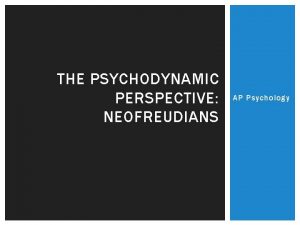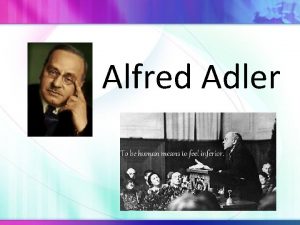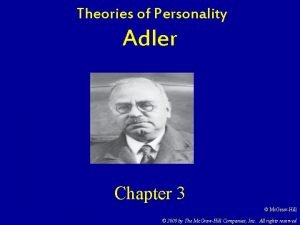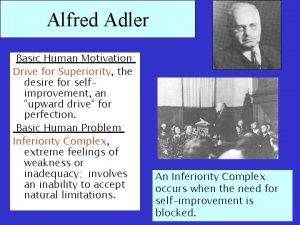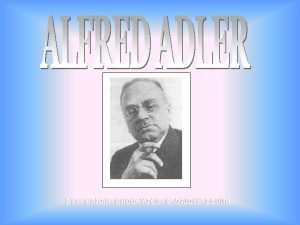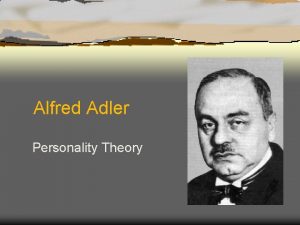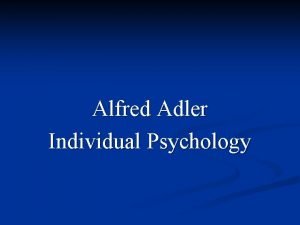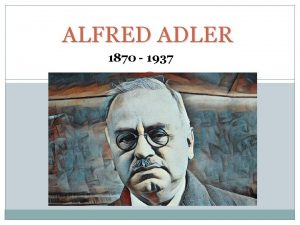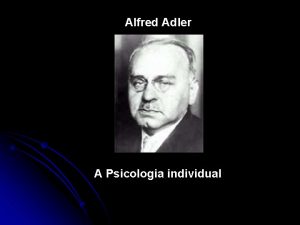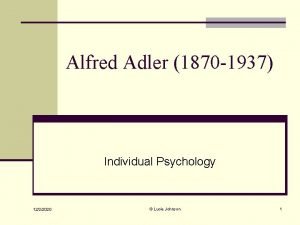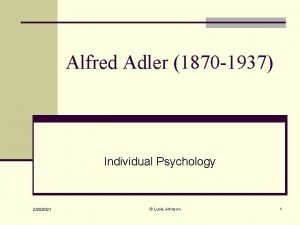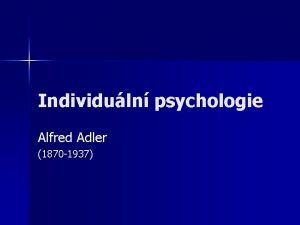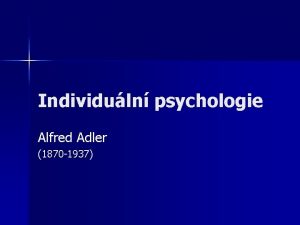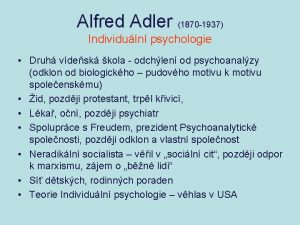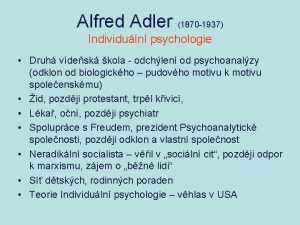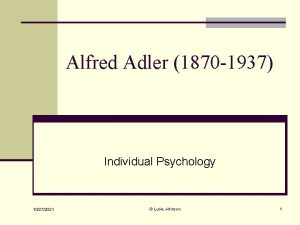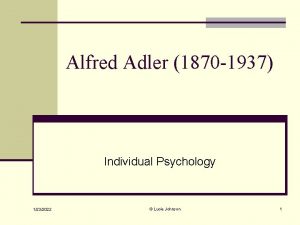ALFRED ADLER 1870 1937 ALFRED ADLER Stressed the























- Slides: 23

ALFRED ADLER 1870 -1937

ALFRED ADLER • Stressed the need to understand individuals within their social context • Addressed issues such as equality, parent education, influence of birth order, life style, and the holism of individuals • We all have one basic goal or desire to belong and feel significant

ALFRED ADLER • When we feel encouraged, we feel capable and appreciated and generally act in a connected and cooperative way • When we are discouraged, we may act in unhealthy ways by competing, withdrawing, or giving up • It’s finding ways of expressing and accepting encouragement, respect, and social interest that helps us feel fulfilled and optimistic

ALFRED ADLER • “A misbehaving child is a discouraged child. ” • Why do children misbehave?

ALFRED ADLER • Helping children feel valued, significant, and competent is often the most effective strategy in coping with difficult child behaviors

ALFRED ADLER • Inferiority: each of us is born into the world with a sense of inferiority • We start as a weak and helpless child and strive to overcome these deficiencies by becoming superior to those around us • For those of us who strive to be accomplished writers, powerful business people, or influential politicians, it is because of our feelings of inferiority and a strong need to over come this negative part of us according to Adler. This excessive feeling of inferiority can also have the opposite effect. As it becomes overwhelming and without the needed successes, we can develop an inferiority complex. This belief leaves us with feeling incredibly less important and deserving than others, helpless, hopeless, and unmotivated to strive for the superiority that would make us complete.

ALFRED ADLER • Unity of the Individual: thinking, feeling, emotion, and behavior can only be understood as subordinated to the individual’s style of life, or consistent pattern of dealing with life

ALFRED ADLER • Goal orientation: future-orientated striving toward a goal of significance, superiority, or success • Mental health: a realistic goal of socially useful significance or superiority over general difficulties. • Mental disorders: unrealistic goal of exaggerated significance or superiority over others • The early childhood feeling of inferiority, for which one aims to compensate, leads to the creation of a fictional goal which subjectively seems to promise future security or success

ALFRED ADLER • Self-determination and uniqueness: a person’s fictional goal may be influenced by hereditary and cultural factors, but it ultimately springs from the creative power of the individual, and is consequently unique • usually individuals are not fully aware of their goal – through analysis and birth order, repeated coping patterns, and earliest memories, the psychotherapist infers the goal as a working hypothesis

ALFRED ADLER • Social context: the individual is also a part of larger wholes or systems: the family, the community, all of humanity, our planet, and the cosmos • In this concept we meet with three important life tasks- occupation, love and sex, and our relationships with other people – all social challenges • Our way of responding to our first social system, the family constellation, may become the prototype of our world view and attitude toward life

ALFRED ADLER • The feeling of community: each human being has the capacity for learning to live in harmony with society • There is an innate potential for social connectedness which has to be consciously developed • The feeling of genuine security is rooted in a deep sense of belonging and embeddedness within the stream of social evolution

ALFRED ADLER • Mental health: a feeling of human connectedness and a willingness to develop oneself fully and contribute to the welfare of others are the main criteria of mental health • when these qualities are underdeveloped, feelings of inferiority may haunt an individual, or an attitude of superiority may antagonize others • The conscious fictional goal will be self-centered and emotionally or materially exploitive of other people • When the feeling of connectedness and the willingness to contribute are stronger, a feeling of equality emerges, and the individual’s goal will be self-transcending and beneficial to others

INFERIORITY COMPLEX • A person who continually tries to compensate for his weakness and avoid feelings of inadequacy

ALFRED ADLER • Treatment: • Adler was one of the first psychotherapists to disregard the symbolic couch in favor of two chairs, to create a sense of equality between patient and clinician. Adler also focused greatly on family dynamics, specifically parenting and family constellation, as a preventative means of addressing possible future psychological problems. With a practical and goal-oriented approach, Alfred held a theory of three life tasks – occupation, society, and love – that intermingle with one another. Success and health in each and all life tasks is dependent on cooperation

ALFRED ADLER • Adler’s most influential concept is that of social interest. Not to be confused as another form of extraversion, social interest should be viewed as an individual’s personal interest in furthering the welfare of others. Collaborating and cooperating with one another as individuals and communities can progress to benefit society as a whole.

WHY DO SOME CHILDREN LACK SOCIAL INTEREST? • According to the social interest theory if a child failed to develop social interest then he might try to reach his goals in a way that is harmful to the society • Individual psychology is based on the principle that each person has a certain line of direction or a big goal that he is going after. The person tries to use all of the resources available to him to reach that important goal. • If the person lacked social interest he might consider harming others as a possible option that can help him reach his goals if he didn't find any other way.

ALFRED ADLER • Parenting styles: • Adler identified two parental styles that he argued will cause almost certain problems in adulthood. The first was pampering, referring to a parent overprotecting a child, giving him too much attention, and sheltering him from the negative realities of life. As this child grows older, he will be ill equipped to deal with these realities, may doubt his own abilities or decision making skills, and may seek out others to replace the safety he once enjoyed as a child.

ALFRED ADLER • Parenting styles: • On the other extreme is what Adler called neglect. A neglected child is one who is not protected at all from the world and is forced to face life's struggles alone. This child may grow up to fear the world, have a strong sense of mistrust for others and he may have a difficult time forming intimate relationships.

ALFRED ADLER • Parenting styles: • The best approach, according to this theory, is to protect children form the evils of the world but not shelter them from it. In more practical terms, it means allowing them to hear or see the negative aspects of the world while still feeling the safety of parental influence. In other words, don't immediately go to the school principal if your child is getting bullied, but rather teach your child how to respond or take care of him/herself at school.

ALFRED ADLER • Birth order: • According to Adler, eldest children are socially dominant, highly intellectual, and extremely conscientious. Unfortunately, they’re also less open to new ideas, and prone to perfectionism and people pleasing – the result of losing both parents’ undivided attention at an early age, and working throughout their lives to get it back.

ALFRED ADLER • Birth order: • Middle children, sandwiched between older and younger siblings, often develop a competitive nature – making them natural entrepreneurs later in life. They tend to be the most diplomatic and flexible members of the family and often, eager for parental praise, develop musical or academic gifts.

ALFRED ADLER • Birth order: • Youngest children, according to birth order theory, tend to be dependent and selfish – as they’re used to others providing for them. But despite the negatives, they’re also quite often the life of the party – fun, confident, and comfortable entertaining others.

ALFRED ADLER • Birth order: • Only children, like last borns, they are regularly spoiled, according to Adler, and have a hard time when they don’t get their own way. School can be a particularly difficult transition, as they’re used to being the center of the familial universe. But all that parental focus pays off. Only children are often mature for their age. They wow people with their vocabularies, and their comfort in adult circles. Plus, all that self-entertaining fosters creativity.
 Adler mengemukakan bahwa tujuan akhir hidup manusia adalah
Adler mengemukakan bahwa tujuan akhir hidup manusia adalah Alfred adler theory of personality
Alfred adler theory of personality Psychodynamic theories ap psychology
Psychodynamic theories ap psychology Adler birth order
Adler birth order Alfred adler was a neo freudian who coined the term
Alfred adler was a neo freudian who coined the term Creative power adler
Creative power adler Tom's constant shoplifting suggests
Tom's constant shoplifting suggests Alfred adler motivation
Alfred adler motivation Children who release unexpressed anger
Children who release unexpressed anger Alfred adler birth order
Alfred adler birth order Alfred adler birth order
Alfred adler birth order Alfred adler biography
Alfred adler biography Theory of adler
Theory of adler Gerindo berdiri di jakarta 24 mei 1937 akibat dari
Gerindo berdiri di jakarta 24 mei 1937 akibat dari Cuando nacio salvador dali
Cuando nacio salvador dali Modernism picasso
Modernism picasso 1937-1871
1937-1871 1937
1937 July 2 1937 amelia earhart
July 2 1937 amelia earhart 1937 computer
1937 computer 1937 computer
1937 computer Why is the 1936-1937 period known as the “crack-up”?
Why is the 1936-1937 period known as the “crack-up”? Over land by rail’, gustave dore, 1870
Over land by rail’, gustave dore, 1870 Capital of kansas
Capital of kansas
